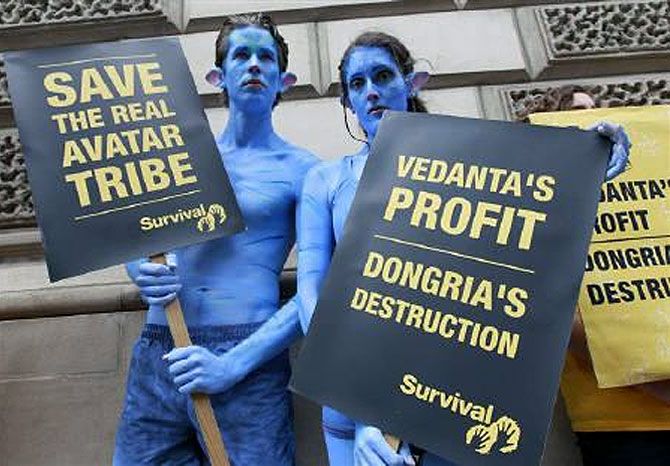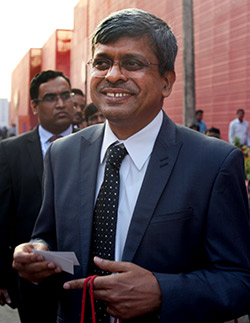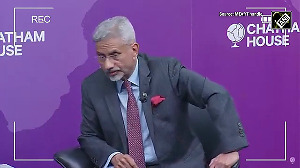'As of now there are no mining activities,' but 'who knows the future?'

"As of now there are no mining activities," Aditya Prasad Padhi, Odisha's chief secretary, tells Prasanna D Zore/Rediff.com, but adds cryptically, "who knows the future?" when asked about the current status of mining in and around the Niyamgiri Hills.
Tribal organisations and the Dongria Kondhs, who consider the Niyamgiri Hills sacred, have been locked in a battle since 2013 over the Anil Agarwal-owned Vedanta Resources' plans to mine bauxite from the ecologically fragile, but thickly forested hill.
In 2013, gram sabhas of 12 villages around the Niyamgiri Hills had unanimously rejected Vedanta's plan under the Forest Rights Act and the Panchayats Extension to the Scheduled Areas, PESA, Act of 1996.
"The same situation exists even today," Padhi, left, below, reiterated in Mumbai last fortnight.
When asked if he was hopeful about the Odisha government convincing the tribals to allow mining in the hills when he remarked 'who knows the future?' during a media encounter, Padhi told Rediff.com on the sidelines of an investors meeting, "It is for the people of the region to understand the benefits that it will bring."
The Odisha government, he added, was not in any talks with the tribal organisations leading the agitation against mining in the area.
Summarising efforts undertaken by his government to attract investments into Odisha that is rich in mineral and natural resources, Padhi said "the state government owns 10,000 acres of land for immediate use."

"The Odisha government owns one lakh (100,000) acres of land bank for investors," he added, "that is, more or less free of encroachments and other encumbrances."
Padhi, however, could not provide details about the geographic spread of these land banks or if they were proximate to ports.
On March 1, Nitin Sethi, reporting for Business Standard, wrote:
The Odisha government has challenged the landmark Vedanta bauxite mine judgment of the Supreme Court which upheld the statutory powers of the tribal village councils under the Forest Rights Act and the Panchayat (Extension to Scheduled Area) Act to decide if they wish mining to take place in their traditional forestlands or not.
Filing a new interlocutory application before the apex court, the Odisha government has claimed that the Forest Rights Act and its rules do not require any consent from gram sabhas (village councils) for use of forestlands if the government decides that the rights of the people have been settled.
If the application filed by the state against the Union government is accepted by the courts for hearing, it could also force the NDA government to take a public stand on the issue after having deliberated the dilution of tribal consent powers behind closed doors since 2014 when it came to power.
In its application, which Business Standard reviewed, Odisha has also contended that gram sabha resolutions rejecting mining in the Lanjigarh bauxite mines cannot remain perpetually in force. The state government has claimed that with adults dying in the community and new ones growing up to have voting rights in the gram sabha decisions should be up for review.
The state has additionally claimed in its application that there were technical errors in the way the gram sabhas were conducted and the resolutions passed to refuse mining in their traditional lands.
Making these and other pleas, the state has asked that the gram sabha decisions be set aside, the meeting of the councils be held afresh and the environment ministry’s order rejecting mining based on the tribals' decisions also be quashed.
The Supreme Court judgment of 2013 ordered that the 12 gram sabhas of the Dongaria Kondh, Kutia Kandha and other tribal communities would decide if they held any religious and other rights over the Niyamgiri Hills of Odisha and if the mining of bauxite in the Lanjigarh mines below the peak of the hill would affect their religious rights.
The court held that if the rights were affected by the proposed mining then the clearances to mining rights stood to be cancelled.
Under supervision of the tribal affairs ministry and the local administration, in what turned out to be a rather high-profile event garnering domestic and international attention, 12 gram sabhas unanimously rejected the mining that the Odisha Mining Corporation was to do in a joint venture with Vedanta.
Consequently the environment ministry rejected the clearance to the project.
The marquee landmark reaffirmed the power of the tribal and other forestdwellers gram sabhas as statutory authorities under the Forest Rights Act.
The present NDA government has since 2014 attempted to also do away with the need for tribal consent, trying various formulations and interpretations to dilute or do away with it.
With meetings on the matter continuing at the highest level the tribal affairs ministry has repeatedly warned that doing away with powers of consent would be unconstitutional and illegal, requiring an amendment to the law through Parliament in light of the Supreme Court's Vedanta judgment.
Nearly three years after the court passed the order, the state government has come to court with the plea, which could do away entirely with the need for consent from tribals before using their traditional forestlands for industrial purposes.
In the petition, which is listed to be heard on Friday (March 4), the Odisha government contends that 'various general claims of worshipping all the hills in the Niyamgiri range, including NIyamgiri Dangar (the site of mines) were made and all the persons who attended were unanimous in their opposition to the Bauxite Mining Project.'
But the state government then notes, 'However, pertinently, not a single member of the Gram/pali Sabha explained how a claim could be made over an entire plateau situated far away from the abode of Niyam-Raja (the tribe's traditional god).'
It has also contended that the tribals did not follow several other technical requirements of the court order and 'overlooked the interplay between the declaration of law and determination of religious/sacred rights as permitted by the court and even beyond the provisions of the Forest Rights Act.'
Using these arguments, even as it claims the consent of tribals under the law is not required, Odisha has asked the Supreme Court to quash the decisions of the gram sabha and hold their meetings afresh.
On Friday the Supreme Court could decide whether to admit the application or not.











 © 2025
© 2025